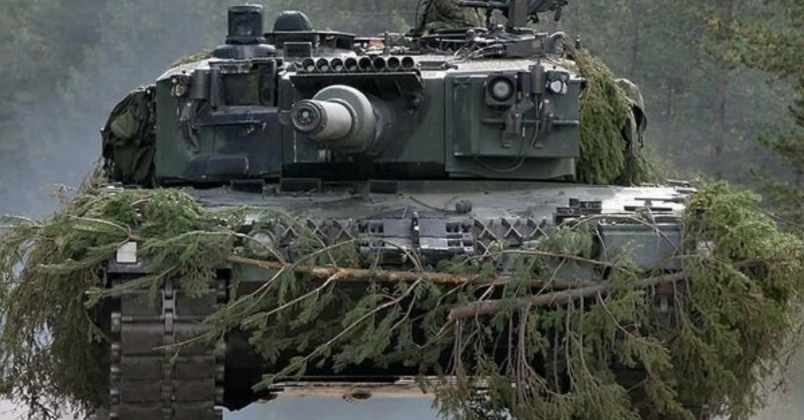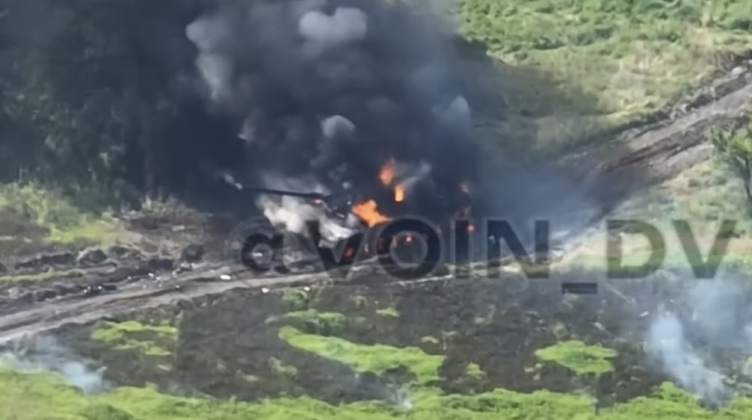News
Germans Now Operating Leopard Tanks in Ukraine: Are Captured Crews Mercenaries or Servicemen?

A Russian reconnaissance team was reported on September 24 to have captured a German speaking tank crew after destroying a Leopard tank in Ukraine’s Zaporozhye region. The team leader stated in a report to state media on September 23: “When we curbed another offensive and ATGM-ed [destroyed with an anti-tank guided missile] the Leopard, we moved out to the burned vehicle hoping to seize the ‘tongue.’ Then we saw that the crew’s driver-mechanic was severely injured and the others were dead. Once he awoke, the mechanic started yelling ‘nicht schiessen’ [‘do not shoot’].” Regarding the capture of the German speaking survivor, he observed: “The mechanic repeatedly stated that he was not a mercenary but a Bundeswehr serviceman, and that he and the rest of the crew were members of the same unit of the German army.” He added that the German serviceman named his brigade and its dislocation site. Russian infantry widely use various variants of the Kornet anti tank guided missile, which has proven capable of destroying Ukraine’s best armoured tanks the British Challenger 2, and is thus considered more than capable of neutralising all variants of the Leopard 2 even when striking their harder frontal armour.
Although contractors from across the Western world have been widely reported to have been involved in combat operations in Ukraine, the deployment of active duty personnel as the German tank operator claimed to be would also be far from unprecedented. Western countries have widely deployed not only special forces and supporting personnel, the latter for roles such as command and control and logistics, but they have also deployed frontline combatants from regular units. One of the most notably examples has been the deployment of British Royal Marines for frontline combat roles from April 2022, which was for months alleged by Russian sources before being confirmed by a Marine general in December that year. It has long been speculated that Western personnel, whether contractors or active servicemen, would operate many of the more complex assets being transferred to Ukraine, a notable example being the Patriot missile batteries dispatched in a far shorter time than it would have taken to train Ukrainian operators.

It remains uncertain whether the captured German tank operator was indeed a Bundeswehr serviceman as he claimed – as this would have entitled him to superior treatment as a prisoner of war which would not be the case for mercenary contractors. Reports that German personnel are operating the Leopard tanks being delivered to Ukraine nevertheless has the potential to invigorate Russian popular support for the war effort, with the Leopard being a successor to the Panther and Tiger tanks of the Second World War era when German led a European coalition to invade the Soviet Union. Since the coming to power of the Olaf Scholz administration in early 2022 Germany transformed from among the most reserved in its support for NATO military activities in Eastern Europe to among the most resolved and committed to supporting the war effort in Ukraine. As a result the deployment of either contractors or even active Bundeswehr servicemen would be far from out of line with broader German policies. Germany has nevertheless seen its economy weather some of the most significant disruption due to the fallout from the Russian-Ukrainian War, with its GDP slipping to sixth place behind Russia in 2022 as a result.

Leopard 2 tanks including modern Leopard 2A6 variants have taken significant losses in Ukraine since the beginning of Ukrainian offensives against Russian positions in early June, with losses among the older Leopard 2A4 and Leopard 1 tanks being significantly heavier still. It is uncertain whether German personnel have begun to deploy to the theatre recently, or whether they have been involved in combat operations over the last four months and may have taken losses accordingly. Warnings have grown since mid 2023 from both Western and Russian sources that more NATO member states could deploy active servicemen to Ukraine in much greater numbers should Ukrainian forces falter, with Poland and the Baltic states having initially been expected to take the lead in doing so. While supplying its own tanks, Berlin has also sought to acquire Leopards from third parties, most notably Switzerland, to increase its capacity to arm Ukraine. Much regarding the extent of German involvement in the war effort has yet to be revealed publicly, as is the case for several Western states participating actively in the conflict.












